2013新外研版初一英语下知识点总结
外研版七年级下册英语重点知识点汇总
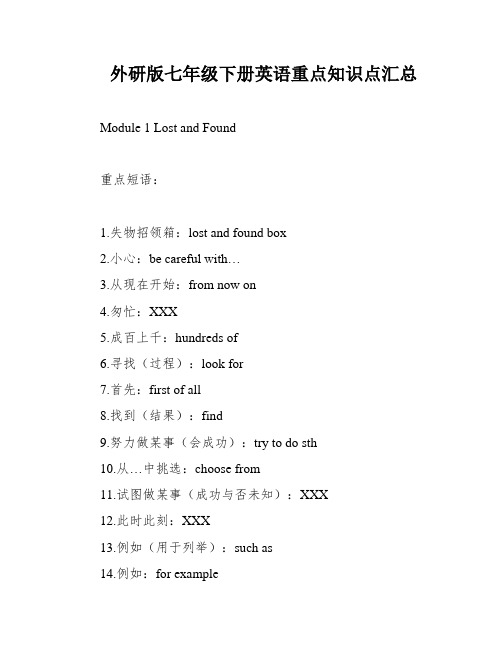
外研版七年级下册英语重点知识点汇总Module 1 Lost and Found重点短语:1.失物招领箱:lost and found box2.小心:be careful with…3.从现在开始:from now on4.匆忙:XXX5.成百上千:hundreds of6.寻找(过程):look for7.首先:first of all8.找到(结果):find9.努力做某事(会成功):try to do sth10.从…中挑选:choose from11.试图做某事(成功与否未知):XXX12.此时此刻:XXX13.例如(用于列举):such as14.例如:for example重点句型:1.这是谁的 (XXX)2.帮助某人做某事:help sb do XXX.3.请小心保管…:XXX…4.欢迎来到…:e to +地点5.给某人打call sb at +电话号码语法总结:物主代词:表示所属关系的代词(…属于谁的)单数:人称形容词性物主代词名词性物主代词第一人称 my XXX第二人称 your yours第三人称 his hers its复数形容词性物主代名词性物主代第一人称 our ours第二人称 your yours第三人称 their theirs形容词性物主代词:必须和名词在一起,例如XXX,your XXX…名词性物主代词:相当于与之相对应的形容词性物主代词+名词,例如XXX.Module 2 What Can You Do?重点短语:1.与某人相处融洽:get on well with sb.2.弹钢琴:play the piano3.打乒乓球:play table XXX4.…怎么样?=how about…。
what about…5.担心…:XXX…6.擅长做某事:be good at doing sth.7.放风筝:fly a kite重点句型:无语法总结:无2.high-tech高科技的3.XXX虚拟现实4.XXX机器人仆人5.XXX太空旅行6.XXX可再生能源7.self-driving cars自动驾驶汽车8.ic engineering基因工程9.XXX寿命10.artificial intelligence人工智能重点句型】1.In the future。
外研版英语七年级下册知识点(通用8篇)

外研版英语七年级下册知识点(通用8篇)外研版英语七年级下册知识点(1)一、单词辨析wear, in 与putwear 动词,穿着,戴着。
强调穿的状态。
in 介词,后接衣服或颜色的词。
着重衣服的款式或颜色。
put on 动词,穿上,戴上,强调穿的动作,后接衣服,鞋帽。
spend 花费,度过①+ spend +时间/金钱+ on 人在上花费时间/金钱eg:I spend much time on②+ spend +时间/金钱+ ( in) doing 花费时间金钱做某事eg: I spend much time watching③+spend +时间+ with + 和某人一起度过。
eg: I spend my weekend with my二、短语forward to + / 期待某事/期待做某事eg:We are looking forward to visiting Hong 我们都很期待去香港玩。
I am looking forward to your 我很期待你的到来。
go sightseeing = do some sightseeing观光游览类似结构:go shopping 购物 go cooking 做饭go washing 洗衣服 go cleaning 打扫卫生a picnic 去野餐英语中经常用have或take, make等动词+ 组成词组。
eg:have a good time 玩得高兴 have a rest 休息一会take a walk 散步 make a presentation 做一个介绍oneself 过的愉快相当于have a good time, 在口语中,用作祈使句。
eg:I’m going to enjoy myself during the May Day 我打算在五一假期好好玩一玩。
I hope you enjoy yourself this 我希望你今晚过的愉快。
外研版七下英语知识点总结大全

外研版七下英语知识点总结大全
1.单词拼写:外研版七下英语中涉及的各种单词的正确拼写。
2.词汇释义:外研版七下英语中涉及的各种词汇的含义和用法。
3.句型转换:外研版七下英语中常见的句型转换题型,包括主动语态
和被动语态、一般现在时和一般过去时等。
4.语法知识:外研版七下英语中的语法知识点,包括名词、动词、形
容词、副词、冠词、代词、介词、连词等。
5.短语搭配:外研版七下英语中涉及的各种短语的搭配和用法。
6.句子结构:外研版七下英语中常见的句子结构,包括简单句、复合句、并列句、主从句等。
7.语篇理解:外研版七下英语中的各种语篇理解题型,包括阅读理解、完形填空等。
8.写作训练:外研版七下英语中的写作训练题型,包括书面表达、句
子填空等。
9.听力训练:外研版七下英语中的各种听力理解题型,包括听对话选
择图片、听句子选择答案等。
10.阅读训练:外研版七下英语中的阅读理解题型,包括选择题、填
空题、选择短文标题等。
11.口语表达:外研版七下英语中常见的口语表达题型,包括问答题、情景对话等。
12.语法填空:外研版七下英语中涉及的语法填空题型,包括完成句子、完成短文等。
13.同义替换:外研版七下英语中的同义替换题型,包括同义词、近义词等。
14.听音识图:外研版七下英语中的听音识图题型,包括听音选图、听音选词等。
16.听说训练:外研版七下英语中的听说训练题型,包括听音说话、听音对话等。
新外研版七年级英语下知识点总结
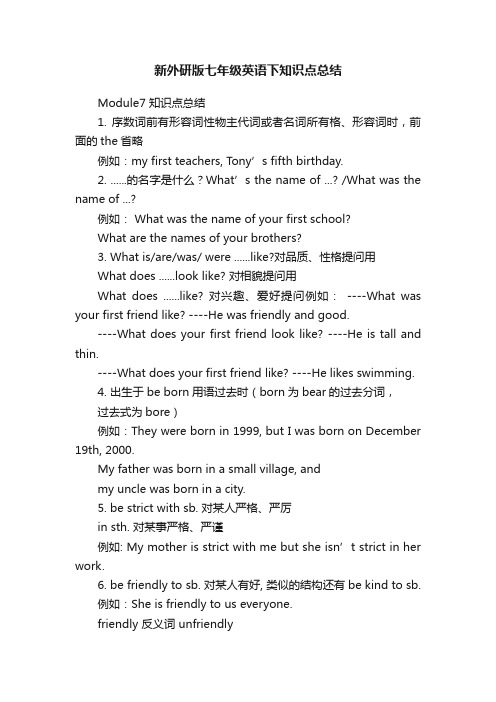
新外研版七年级英语下知识点总结Module7 知识点总结1. 序数词前有形容词性物主代词或者名词所有格、形容词时,前面的the省略例如:my first teachers, Tony’s fifth birthday.2. ......的名字是什么?What’s the name of ...? /What was the name of ...?例如: What was the name of your first school?What are the names of your brothers?3. What is/are/was/ were ......like?对品质、性格提问用What does ......look like? 对相貌提问用What does ......like? 对兴趣、爱好提问例如:----What was your first friend like? ----He was friendly and good.----What does your first friend look like? ----He is tall and thin.----What does your first friend like? ----He likes swimming.4. 出生于be born用语过去时(born为bear的过去分词,过去式为bore)例如:They were born in 1999, but I was born on December 19th, 2000.My father was born in a small village, andmy uncle was born in a city.5. be strict with sb. 对某人严格、严厉in sth. 对某事严格、严谨例如: My mother is strict with me but she isn’t strict in her work.6. be friendly to sb. 对某人有好, 类似的结构还有be kind to sb.例如:She is friendly to us everyone.friendly 反义词 unfriendly以ly结尾的形容词还有,lovely,lonely,ugly,silly,weekly,monthly,等等7. (a) very adj./adv.(原形) + n.太....,非常....,很..... quite( a/ an)+ adj./adv.(原形) + n.so+ adj./adv.(原形) +that +从句译为:如此…以至于too adj. to do sth. 译为:太……而不能例如: a very big watermelonquite a big watermelonThe watermelon is so big that I can’t eat it all.The watermelon is too big to be eaten.8. past 与pass的区别past 为介词,副词,形容词,如:(1). go past the hospital and turn left.(2). They are talking about past life. (3). It’s ten past four.而pass为动词,如: Please pass me the pen.The police car passed slowly.9. “在某地有……要做”用句型there is/are/was/were +sth.+to do…例如:There were a lot of things to do in Quincy.There are lots of interesting places to visit in Tianjin.表示“某人有某事要做”用have/has sth. to do例如: They had many things to do, and I have lots of books to read.10. one of + 名词复数表示“……中之一” One of my dear friends is a police.two of /some of/ many of/ most of……one of + the+最高级+名词复数例如:The Yangtze River is one of the longest rivers in China.Most of the people in this room are over forty.11. ……there was a big garden with lots of trees and therewas a small lake with many fish in it.with 的用法总结with用法归纳(1)“用……”表示使用工具,手段等。
外研版七年级下英语知识点总结

Unit1 Can you play the guitar?1.常见的情态动词:cancouldmaymightmust shall shouldwillwould等情态动词+动词原形,疑问句中情态动词提前,否定句在情态动词后加not。
2.Play+ the+乐器play the guitar. play the drums. play the piano. play the violin Play +球类.棋类.牌类游戏play volleyball. play chess.play cards.Play(games)with sb. 和某人一起玩(游戏)3.Join+组织或者人Join the art club join sb. Join in+竞赛.娱乐.游戏等Take part in+活动加入到某活动中Be in 参加.加入.穿着4. what club do you want to join?你想要参加什么俱乐部?The singing club唱歌俱乐部the drawing club 绘画俱乐部the dancing club舞蹈俱乐部the swimming club游泳俱乐部the story telling club 讲故事俱乐部The music /English /art/chess/sports club 音乐/英语/美术/象棋/运动俱乐部5. Pianist钢琴家violinist小提琴手singer歌手dancer舞蹈家musician音乐家6.Let sb do sth 让某人做某事Let’s+动词原形让我们做某事7.Say+内容say hello to sb. say sorry to sb. say to sb.Speak+语言speak English/Chinese/Japanese speak to sb.Talk 谈论talk about sth. talk with sb. talk to sb. talk show脱口秀Tell 告诉.讲述tell sb. sth= tell sth to sb.告诉某人某事tell sb. about sth 告诉某人关于某事tell sb. to do sth. 告诉某人去做某事tell sb. not to do sth 告诉某人不要去做某事tell stories/ jokes/lies讲故事/讲笑话/说谎Ask问.要求ask for 请求ask sb for sth 向某人索要某物ask about询问关于某事ask sb. about sth询问某人关于某事ask sb to do sth 要求某人去做某事ask sb not to do sth要求某人不要去做某事8.Want to do sth.= would like to do sth.=feel like doing sth.想要做某事Want sb. to do sth.= would like sb. to do sth.想要某人做某事Want to be+adj want to be + 职业9.What about =how about,后接名词,代词,动名词what about you你呢?what about the book这本书怎么样?what about dancing跳舞怎么样?10.也:too 肯定句末(前面加逗号)Either否定句末(前面加逗号)Also 实前助后As well 口语中(前面不加逗号)11.be good at+ sth/doing sth=do well in 擅长于…be good for 对…有益(be bad for对…有害)be good to 对…友好(good 可用friendly.nice.kind替换)be good with和…相处好=get on well with= get along well with12.感官动词(look. sound. taste. smell. feel)+ adj做表语13.选择疑问句用or来连接选择部分.回答不用Yes或No.要从中选择一个回答14.students wanted for school show(wanted表示招募.含有被动意义)15.show sth to sb=show sb sth让某人看某物the school show 学校演出give sth to sb=give sb sth给某人某物16.help sb do sth Help sb with sth helpful有帮助的With one’s help= with the help of sb在某人的帮助下Help oneself to 随便享用can't help doing sth.情不自禁做某事17.be busy doing sth忙于做某事be busy with sth忙于某事18.need to do sth need sb to do sth need….for…19.be free to do sth= have time to do sth有时间去做某事Have no time= don’t have time=be busy 没有时间20.make friends with sb 和某人交朋友make money 赚钱make a living 谋生make faces做鬼脸make fun of sb取笑某人21.call sb. at +电话号码call sb. back 给某人回电话22.on the weekend= on weekends23. English-speaking students说英语的学生(English-speaking有连词符,是形容词)24.do kung fu练功夫The old people’s home老人之家the Students’Sports Center25.It is +adj +for sb to do sth做某事对于某人是...形容词修饰名词.副词修饰动词或者形容词26.teach sb sth教某人…. Teach me Chinese teach him MathTeach sb to do sth 教某人去做某事Learn to do sth 学习做某事learn from sb./sth向某人学习、从某事中学习27. Write down写下write to sb =write a letter to sb.给某人写信write back to sb 给某人回信hear from sb 收到某人的来信At least至少make a poster制作海报28.定冠词the的用法(1)特指某(些)人或某(些)物,这是定冠词的基本用法。
外研版初一英语下册知识点总结外研版初一英语下册知识要点

外研版初一英语下册知识点总结外研版初一英语下册知识要点I listened carefully but I heard nothing.我仔细听但什么也没听到。
2. ODULE 21. ODULE 31. check my email 查收我的邮件2. get up early 起早3. have a picnic 郊游4. go to a party 去参加聚会5. at the party6. revise / revieODULE 51. seven millionmillions ofmillions of Americans2. ansy brother is good at basketball.我哥哥擅长打蓝球。
My brother is good at playing basketball.3. ing. 句子中有than,要用比较级24. 比较级规则变化口诀:比较级,要变化,一般词尾加er。
(long-longer)词尾若有哑音e, 直接加r就可以。
(nice-nicer)重读闭音节,单辅音字母要双写。
(hot-hotter)辅音字母若加y, 记得把y变为i。
(happy-happier)MODULE 71. the longest journey 最长的旅程2. by 直接加交通工具单数by bike/ bus/ train3. get to school 到学校get home/there/here 到家4. live farthest from the school 住得离学校最远farthest 为副词,是far的级,可省略the,形容词级前面一定要加the5. the ( best )ODULE 101. listen to the radio 听收音机2. Teachers’ Day arch April May June July August SeptemberOctober November December4. start school 开始上学start/begin to do sth.start doing sth 开始做某事5. ride a bike to sputer games 玩电脑游戏7. es like chess. (like 像 )8. ovies = see films 看电影9. 英语人称顺序:你,他/她,我 (I 放在最后)10. visit sb. 看望某人11. near the sea 在海边 on the beach 在海滩上12. travel by car/ train/ …乘……旅行13. play the piano弹钢琴14. go as 一位作家和诗人17. some of his (the) most famous plays一些他的最的戏剧18. at school 在学校19. like ove to spany 加入一家剧团24. a successful actor 一名成功的演员(success, successful, successfully, succeed) 25. start any other languages 用许多其它的语言 27. one of the most famous ous railroad一位铁路的工程师3. the Chinese government 中国政府4. ent e day 在同一天3. ODULE A1. ickey.这些包是米奇的形状.17. fill … as Day 或 at Christmas 在圣诞节on Neg Festival。
七年级下外研版知识点总结
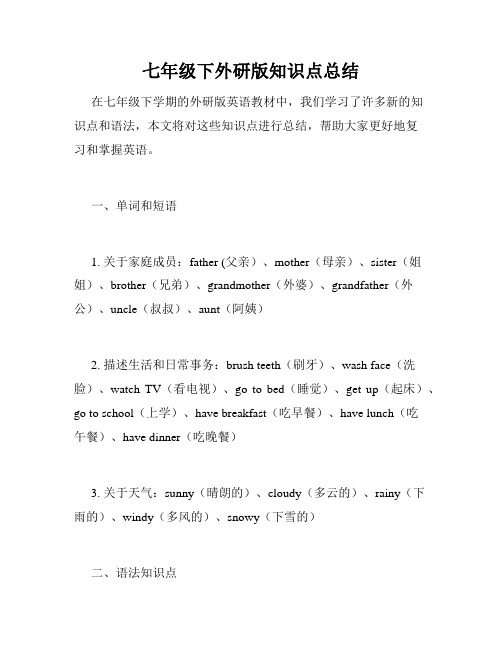
七年级下外研版知识点总结在七年级下学期的外研版英语教材中,我们学习了许多新的知识点和语法,本文将对这些知识点进行总结,帮助大家更好地复习和掌握英语。
一、单词和短语1. 关于家庭成员:father (父亲)、mother(母亲)、sister(姐姐)、brother(兄弟)、grandmother(外婆)、grandfather(外公)、uncle(叔叔)、aunt(阿姨)2. 描述生活和日常事务:brush teeth(刷牙)、wash face(洗脸)、watch TV(看电视)、go to bed(睡觉)、get up(起床)、go to school(上学)、have breakfast(吃早餐)、have lunch(吃午餐)、have dinner(吃晚餐)3. 关于天气:sunny(晴朗的)、cloudy(多云的)、rainy(下雨的)、windy(多风的)、snowy(下雪的)二、语法知识点1. 一般现在时一般现在时用于:1)表现习惯、规律或真理;2)表述经常性或本质属性不变的事实;3)表示现在不断重复发生或存在的状态。
例如:- She usually goes to the park on weekends.- I play tennis every Wednesday afternoon.- The sun rises in the east.2. 疑问句在构造疑问句时,需要把助动词放在主语前。
如果使用的是be 动词,直接将它放在句子的前面即可。
例如:- Do you like pizza?- Are they sisters or friends?3. 情态动词情态动词是用来表示说话人的态度、意图、判断或建议的动词。
它们无法用作主语或宾语。
例如:- Can you help me carry this bag?- You should study for the test.- I might go to the party tonight.4. 数词在英语中,数词分为基数词和序数词两种。
七年级英语下册语法知识点归纳总结外研版

七年级英语下册语法知识点归纳总结外研版一、时态1. 一般现在时:主要用来表示经常性、习惯性、规律性的动作或状态,也可用来表示现阶段发生的事件和现阶段存在的事物状态。
其用法主要通过动词的形式来体现。
2. 现在进行时:用来表示现阶段正在进行或经常发生的动作,其用法与一般现在时类似,通过动词的现在分词形式来体现。
二、名词复数规则1. 一般情况下,直接在词尾加s。
如:book-books,map-maps 等。
2. 以s,x,sh,ch结尾的名词,加es。
如:bus-buses,box-boxes等。
3. 以辅音字母加y结尾的名词,变y为i再加es。
如:country-countries,factory-factories等。
三、代词用法1. 人称代词:表示代词所指的人或事物在句子中的关系,分为主格和宾格两种形式。
2. 物主代词:表示所有关系的代词,分为形容词性物主代词和名词性物主代词两种形式。
四、介词用法1. in,on,at表示时间或地点的方式。
如:in the morning,on Monday,at the table等。
2. by,with表示方式或工具。
如:by bus,with a pen等。
五、形容词比较等级用法1. 比较级:表示两者之间的比较,通过比较级后缀-er或连词than来体现。
2. 最高级:表示三者或三者以上之间的比较,通过最高级后缀-est或副词very,most来体现。
六、一般疑问句及回答一般疑问句是将疑问句以系动词be或助动词do及其时态形式提出,并用简短的肯定或否定回答。
通常用yes或no来回答。
以上就是七年级英语下册语法知识点归纳总结外研版的主要内容,希望对学生们的学习有所帮助。
外研社新版七年级英语下册知识点总结

外研社新版七年级英语下册知识点总结外研社新版七年级下册知识点总结Module 1 1、lost and found 失物招领2、e back to 欢迎回. e to +表示地点的名词欢迎来某地e home 欢迎回家You are e. 不用谢。
3、first of all 首先4、there be 句型中谓语动词采用就近原则5、a lot of =lots of 许多既可以修饰可数名词,也可以修饰不可数名词。
6、from now on 从现在开始from then on 从那时开始7、talk to sb 和某人说话(侧重主动说)talk with sb 和某人说话(侧重两人都说)talk about sth 谈论某事say 说,强调说的内容speak 说,后面可以直接接语言speak English/Chinese speak to sb 和某人说话tell sb sth=tell sth to sb告诉某人某事look over检查w W w .x K b 1.c o M look after =take care of 照顾look forward to +doing sth.期盼,期待8、get on the bus 上公交车get off the bus 下公交车9、in a hurry 匆忙地hurry up=e on 快点儿hurry to do sth 匆忙做某事10、hundreds of 成百的(概数加s,加of)two hundred (确数不加s,不加of)同样用法还有thousand、million(百万)17、帮助某人做某事help sb (to)do sth help sb with sth18、__whose ... is this?这是谁的...?__It’s+名词性物主代词.20、Are these ...+名词性物主代词?这些...是某人的吗?xK b1 . Co m 语法:人称代词与物主代词Module 2 1、play后接乐器时,乐器名词前要加the 接球类、棋类名词时,不加the play the piano/the violin play table tennis/football/basketball 2、ride a bike 骑自行车4、would like =want would like to do sth=want to do sth 想要做某事would like to be=want to be 想要成为... would like sth=want sth 想要某物3、join加入(团体、组织),并成为其中一员join in 加入活动take part in 参加加入活动(侧重发挥积极作用)4、what about you?=how about you?你呢?what about doing sth?=how about doing sth?做某事怎么样?5、因为because,所以so不能同时出现在一个句子中8、teach sb sth教某人某事6、enjoy后面接名词或动词ing形式7、between 在两者之间between 。
外研版七年级下册英语知识点及短语
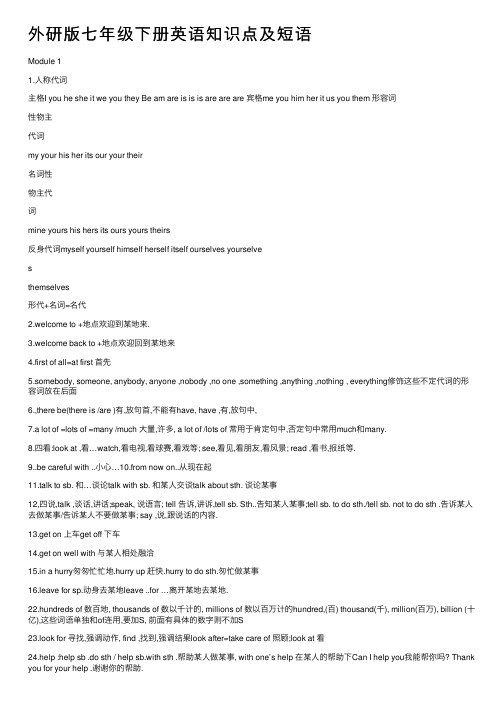
外研版七年级下册英语知识点及短语Module 11.⼈称代词主格I you he she it we you they Be am are is is is are are are 宾格me you him her it us you them 形容词性物主代词my your his her its our your their名词性物主代词mine yours his hers its ours yours theirs反⾝代词myself yourself himself herself itself ourselves yourselvesthemselves形代+名词=名代2.welcome to +地点欢迎到某地来.3.welcome back to +地点欢迎回到某地来4.first of all=at first ⾸先5.somebody, someone, anybody, anyone ,nobody ,no one ,something ,anything ,nothing , everything修饰这些不定代词的形容词放在后⾯6.,there be(there is /are )有,放句⾸,不能有have, have ,有,放句中,7.a lot of =lots of =many /much ⼤量,许多, a lot of /lots of 常⽤于肯定句中,否定句中常⽤much和many.8.四看:look at ,看…watch,看电视,看球赛,看戏等; see,看见,看朋友,看风景; read ,看书,报纸等.9..be careful with ..⼩⼼…10.from now on..从现在起11.talk to sb. 和…谈论talk with sb. 和某⼈交谈talk about sth. 谈论某事12,四说,talk ,谈话,讲话;speak, 说语⾔; tell 告诉,讲诉,tell sb. Sth..告知某⼈某事;tell sb. to do sth./tell sb. not to do sth .告诉某⼈去做某事/告诉某⼈不要做某事; say ,说,跟说话的内容.13.get on 上车get off 下车14.get on well with 与某⼈相处融洽15.in a hurry匆匆忙忙地.hurry up 赶快.hurry to do sth.匆忙做某事16.leave for sp.动⾝去某地leave ..for …离开某地去某地.22.hundreds of 数百地, thousands of 数以千计的, millions of 数以百万计的hundred,(百) thousand(千), million(百万), billion (⼗亿),这些词语单独和of连⽤,要加S, 前⾯有具体的数字则不加S23.look for 寻找,强调动作, find ,找到,强调结果look after=take care of 照顾;look at 看24.help :help sb .do sth / help sb.with sth .帮助某⼈做某事, with one’s help 在某⼈的帮助下Can I help you我能帮你吗? Thank you for your help .谢谢你的帮助.25.think of 想起,想出think about 考虑think over 仔细考虑26.choose from 从…中挑选27.try to do sth. 尽量做某事,尽⼒做某事try not to do sth .尽⼒不做某事try doing sth 尝试做某事try one’s best to do sth .尽⼒做某事try on试穿,试戴28.ask sb. not to do sth .要求某⼈不要做某事, ask sb. to do sth .要求某⼈做某事ask for 询问寻求29.such as 例如30.回答Thank you /Thanks 的句⼦:You’re welcome /Not at all /That’s OK ,/That’s all right ./It’s a pleasure/My pleasure30.leave,遗忘,主要指东西忘在某地⽅,leave sth +地点forget 记忆遗忘31.call sb. 给某⼈打电话, call sb. at +电话号码Module 21.下棋play +球/棋, 不加the play the piano 弹钢琴弹拉乐器,play the +乐器, 要加the2.speak Chinese 说汉语speak English 说英语speak +语⾔3.worry about 担⼼be worried about 对…担⼼,忧虑4.join +组织, take part in 参加活动5.get on well with sb.与某⼈相处得好get on badly with sb .某⼈相处得不好get up 起床, get to 到达6.promise to do sth .答应做某事, promise not to do sth 答应不做某事promise sth .to sb. 许诺某⼈某物.7.I’m sure +句⼦, / I’m sure of /about sth .8.teach oneself ⾃学teach sb. sth .教某⼈某事teach sb. to do sth .教某⼈做某事9.询问意见:1.How about /What about doing sth ? 2.Why not /why don’t you do sth ?/ Would you like to do sth?/ Shall we do sth?./ let’s do sth.10.Would like =want ,想要,愿意, would like sth .想要某物; would like to do sth. 想要做某事;would like sb. to do sth.想要某⼈做某事,Would you like sth ? 回答:Yes ,please . /No ,thanks.11.be good at =do well in 擅长…后跟V-ing12,between⽤于两者,between …and13.tidy up 收拾,整理,14.make sth./sb. +形容词,使某⼈某物怎么样; make sb .do sth 使某⼈做某事,相当于have sb.do sth .=let sb. do sth .15.do cleaning 做清洁do some reading 读书do some washing 洗⾐do some shopping 购物16.ride a bike 骑⾃⾏车,动词短语; 17.fly a kite 放风筝18.swim well 游泳很好well,好地,副词,修饰动词19.Would like to do sth.想做某事20.Would you like to do sth ?你愿意做某事吗?这是有礼貌地提出建议或邀请的句型.肯定回答:Yes ,I’d like /love to . 否定回答:Sorry ,/I’d like to /I’d love to ,but I…..21.like doing sth .喜欢做某事,习惯性的动作;like to do sth .喜欢做某事,暂时性的22.祈使句:肯定祈使句以动词原形开头,否定祈使句以Don’t +V原形开头, 听话你是you.23.问职业:1)What +am/is /are+⼈? 2)What do/does +⼈+do ? 3) What’s one’s job?24.start doing sth .开始做某事, start to do sth .开始做某事, 注:下列情况中start 后接to +V 原形,不能接ing ,1)进⾏时态, 2) start 的主语是物时.25.a kind of ⼀种all kinds of 各种各样的kind of有点26.get ready to do sth 准备做某事be ready to do sth .乐于做某事27.enjoy doing sth .喜欢做某事, enjoy oneself =have a good time =have fun 玩得⾼兴28.keep fit = stay fit =keep healthy =stay healthy保持⾝体健康29.It’s +形容词+(for sb).+to do sth .外界的⽤for ,It’s adj.of sb. to do sth. 本质,⼈格30.give sth to sb .=give sb sth 给某⼈某物give up doing 放弃做某事31.that’s all.仅此⽽已Module 3.语法:⼀般将来时:标志词:tomorrow ,the day after tomorrow ,next…, in +⼀段时间,soon 等.结构: am /is /are going to do sth .或will do sth .there be 的将来时:there is /are going to be 或there will be ….come ,go ,leave ,arrive 的现在进⾏时表将来时.be going to do 和will 的区别:be going to 指打算,计划,will,事先未思考或未计划,be going to do 表⽰近期眼下就要发⽣的事情,will,表⽰将来时间则较远⼀些;be going to 表⽰根据主观表⽰通过客观迹象表明马上要发⽣的,⽽will 是客观上将来势必发⽣的事情.1.have a picnic,野餐go for a picnic 去野餐2.have a meeting 开会; have a walk 散步have a rest 休息have a fight 打架have a look 看⼀看Have classes /lessons 上课3.else,修饰不定代词或特殊疑问词时,放后⾯,且只能修饰这两类词. 如:something else ,somebody else , What else …即:any-,every-,some -,no-开头及由-body ,-one ,thing,- where结尾的不定代词的后⾯.4.on ⽤于具体的某天,并对早中晚进⾏了修饰的也⽤on ;at ⽤于具体的时刻,⼏点.或短语:at night ,在晚上, at noon 在中午at that time 在那时at lunch 在午餐时at the age of 在…岁时in ⽤于年⽉季节,世纪,⼀段时间, in the morning 在上午, in spring 在春天5.alone 孤单的,孤独的,是指个体⼀个⼈, lonely 孤独的,孤寂的,是指内⼼孤独,孤寂6.look forward to doing sth .盼望做某事;7.take a walk=go for a walk 去散步make friends with sb .与某⼈交朋友8.go sightseeing 去观光go –ving go swimming 去游泳go fishing 去钓鱼go boating 去划船9.make a plan做计划plan to do sht .计划做某事10.at the weekend =on the weekend 在周末,11.hope to do sth. 希望做某事hope +that +句⼦12.be busy(in) doing sth ./be busy with sth 忙于做某事13.spend 的⽤法: sb. spend time /money (in) doing sth .花时间/⾦钱做某事Sb. spend time /money /on sth .某⼈在某物上花时间/⾦钱Take 的⽤法:It takes sb .sometime to do sth .14.be different from …与..不同the same as.与…相同15.because of 因为,由于,后跟名词,代词等. Because 后跟句⼦.16.It’s time to do sth .到了该做某事的时间了, It’s time for sth .17.go over 复习18.check my email 查收我的电⼦邮件19.see a movie 看电影20.in the park 在公园⾥21.have a piano lesson 上⼀节钢琴课22.summer holiday 暑假23.go on a summer camp 参加夏令营24.listen to music 听⾳乐26.have fun doing sth .做…很⾼兴. .类似的有,have a good time ,enjoy oneself27.⼈称顺序:你他我, 我们,你们,他们,当要承担责任时,I要放在前⾯.28.在乡下,in the country , 在城市,in the city29.待在家,stay at homeModule 4.1.a piece of paper, ⼀张纸2.a piece of ⼀条,⼀则,⼀⽀,⼀张….3.in the future 在将来4.in+⼀段时间,⽤于将来时,⽤how soon, 提问5.everyone只能指⼈,不能指物, 不能与of 连⽤, 如果与of 连⽤,⽤every one of ,都表单数. no one⽤来回答who ,指⼈,不与of 连⽤, none 回答how many ,指⼈,或物,可与of 连⽤,即:none of6.be able to 相当于can ,,但can 可⽤于主观,⽽be able to ⽤于客观.7.not.. any more=no more 不再,强调数量和程度,⼀般修饰短暂性动词,指某动作不再重复, not ..any longer =no longer 不再,⼀般⽤于延续性动词,表⽰某个动作或状态不再延续, no longer /no more ⾏前be 后/doc/a5dc7a36fd00bed5b9f3f90f76c66137ee064f62.html e true 实现,成真9.change …for…⽤…换….. 10.mean doing sth..意味着做某事11. mean to do sth. 打算做某事12.问天⽓,what’s the weather like ?/ how is the weather?13.四个也:as well,也, 肯定句末,不⽤逗号, too ,也,肯定,句末,逗号隔开. also 也,肯定,句中,⾏前be 后, either 也,否定,句末,逗号隔开14.not only …but also.不仅…⽽且…,谓语动词就近原则15.job,⼯作,可数, work ,⼯作,不可数16,expensive 昂贵的,反义词:cheap 形容物17.interesting 有趣的, 修饰物,后可跟名词, interested ,有趣的,修饰⼈,不可跟名词这类似词有:relax ,excite ,bore ,tire ,…加ing 修饰物,后可跟名词,加ed ,修饰⼈,不可跟名词18.play with 和..⼀起玩19.how much 多少,对不可数数量提问,how long ,多久,对for +⼀段时间等提问, how often多久⼀次,频率提问, how far ,多远,问距离.20.at home 在家, 21.on the Internet 在⽹络上22.all year⼀整年23.free time 空余时间24.chalk 粉笔,不可数名词,可以说some chalk,或a piece of chalk25.by+交通⼯具, by bus ,by bike ,by car ,by train ,by plane=by air, by boat ,by ship=by river=by sea, on foot ,这些是介词短语,放句末,26. maybe ,⼤概,也许,相当于perhaps ,常位于句⾸, may be ,可能是,也许是27.让某⼈做某事:make sb. do sth.=have sb. do sth.=let sb. do sth .28.问外貌:What +do/does +⼈+look like? 或:what +be +⼈+like?问性格:What +be +⼈+like?29.a change of. …的改变Module 51.buy sth for sb.=buy sb. sth 给某⼈买某物类似的有:make sth for sb. =make sb sth .3,what colour 什么颜⾊,对颜⾊提问in colour 有⾊彩的,有颜⾊的4.small ⼀般指⼈或物体的体积⼩,不带感情⾊彩;little ⼩的,带有感情⾊彩,多指对⼈或事物的怜爱.5.try on 试穿,⾐物,代词放中间,名词放后⾯6.too much ,太多,修饰不可数名词,too many 太多,修饰可数名词, much too ,太,⾮常,后跟副词或形容词7.wait for sb. /sth .等候,某⼈或某物,后跟等待的对象.8.a sale on =on sale 打折,降价出售9.half ,⼀半的,half a year ,半年, half a month ,半⽉, half an hour 半⼩时, 注:⼀个半⼩时:one and a half hours =an hour and a half.10.price 价格,问价格可以⽤:how much +be +物?=what’s the price of …注:修饰price 只能⽤low (低,), high(⾼), 形容东西便宜或贵⽤expensive 或cheap.11.have got =have 12.Can I help you?=What can I do for you ?有什么需要帮助的吗?13.How much ,多少,可以对不可数名词的数量,也问价格;how many ,对可数名词数量提问.14.some ,any ,every ,no,可以和thing, one ,body ,where 可以组成不定代词,修饰他们的形容词放后, 和any 组合的⽤于疑问或否定句,和no 组合的,本⾝是否定式.15.safe ,形容词,安全的,反义词:dangerous 危险的,It is +adj+to do sth./It is +for sb. +adj. to do sth .(外界的原因),It is of sb .to do sth.(⼈格,品质)16.pay for ,⽀付pay sb. money for sth .付给某⼈钱买某物.17.四个花费: spend :sb. spend money on sth .Sb. spend time on sth ./sb. spend time (in )doing sth .Take :It takes some time to do sth ./It took some time to do sth .Pay : sb. pay money for sth .Cost : sth .cost sb. money18.life 的复数是live s all one’s life 某⼈⼀⽣, come to life 苏醒过来give one’s life to 献⾝于….19.one of ….中之⼀,后⾯动词⽤第三⼈称单数形式One of the +形容词最⾼级+名词复数后⾯动词⽤三单.20.receive a letter from sb. 收到某⼈的来信,相当于hear from sb.21.a few ,few 修饰可数名词, a little ,little 修饰不可数名词,有a 表⽰有,肯定,没有a 表⽰没有,表否定./doc/a5dc7a36fd00bed5b9f3f90f76c66137ee064f62.html pare …with ..与…作⽐较,同类⽐较;compare ..to …⽐作, 不同类⽐较23.one day ,某⼀天,既表⽰过去的某⼀天,也表⽰将来的某⼀天.24.as…as.中间跟形容词或副词的原级, as …as you can 尽可能….=as..as possible25.popular ,受欢迎的,be popular with ….受..的欢迎.26.and so on 等等27.look at ..看..28.wait a minute 等⼀等29.the price of ….的价格,形容price ⾼⽤high, 低,⽤low.问价格:How much is/are …..? What’s the price of ….30.half price 半价31.at any time 在任何时候32.all right 好吧, 33.go out 出去34.May….? 回答:Yes ,you may /No, you can’t /No ,you mustn’t (表⽰禁⽌,不同意)35.what size ⽤尺码, 36.try to do sth.试图做某事;try doing sth .尝试做某事try one’s best to do sth .尽某⼈最⼤努⼒去做某事.37.乘坐交通⼯具:动词短语: take a /the bus /car /train /plane/taxi ….to +地点drive a car to +地点ride a bike to +地点, walk to +地点fly to 地点介词短语: go to +地点+by car /bus /bike /taxi /train /plane /…/on footgo to +地点+on a /the bus /train/plane ..ship/bike/ in a car/taxi38.way 做某事的⽅式/⽅法,a way to do sth ./ a way of doing sth.on one’s way to 在某⼈去….的路上; by the way 顺便问/说⼀下;in this way ,⽤这种⽅法in the way 挡道; lose one’s way 迷路39.on the Internet 在⽹上, 40.at any time 随时,在任何时候;at times 有时,;in time 及时;on time 按时;at the same time 同时. Module 6.介词:in 在…之内on 在…上⾯; over.在…正上⽅under 在….正下⽅above 在…上⽅, below 在…下⽅by /beside 在…旁边near 在…附近next to 紧挨…. behind 在…后⾯before 在…之前outside 在…外⾯to 到…去from从…来round/around围绕…. Between .在…之间(两者)among 在…之间(三者或三者以上) across 横过、越过……(表⾯横过)through 穿过…内部,⾥⾯通过onto 向上into 进⼊…. Out of …从…出来along 沿着up 向上down 向上opposite 在.. 对⾯问路的句型:Can/Could you tell me the way to ….?Can/Could you tell me how to get to…?Excuse me .Where is ….?How can I get to …?Is there a (an) …near here ?Do you know the way to ..,please ?I want to go to …Do you know the way?I’m looking for …Can you tell me where it is ?1.turn left /turn right 向左转/向右转2. go along =go on =go down沿着,3.Excuse me ,请问;劳驾;对不起,⽤来客所地打断别⼈的话,表对不起,通常在说或做可能令⼈不悦的事情之前使⽤; sorry ,在说或做这种事情之后使⽤,表⽰歉意.4.on a clear day 在晴朗的⼀天5.finish doing sth. enjoy doing sth. practice doing练习做某事, mind doing (介意)6.be famous for …以…(事物,客观的)著名.be famous as ..表⽰以…(⾝份,职业)著名7.get to=arrive in(⼤地⽅)/arrive at (⼩地⽅)=reach 到达8.go across=cross穿过across ,穿过,越过,越过⼀个平⾯, through 穿过(⾥⾯)9. on the right of /on the left of 在…的右边/左边;on one’s left /on one’s right .10. turn 的短语:turn on 打开; turn off 关上turn up 开⼤turn down 关⼩…11.Why not do sth?+Why don’t you do sth .?为什么不…呢提建议建议:1.why don't you do sth?=why not do sth?2.How about doing sth?=what about doing sth?3.You should /can do sth.4.Remember to do sth.5.Don't forget to do sth.6.can you do sth ?7.Let's do sth. 8.It'sa good idea to do9.would you like to do ? 10.Shall we do11.You'd better (not )do sth.回答:That's a good idea.Thanks a lot.Great, OK. That's right. All right. Good idea. Sure.12.tell sb.sth.=tell sth .to sb. 告诉某⼈某事tell sb. to do sth ./tell sb .not to do sth .告诉某⼈做某事,/告诉某⼈不做某事类似的有:ask sb. to do sth /ask sb. not to do sth . not 放在to 的前⾯13.the way to …去…的路on the way to ….在去….的路上.后跟home ,here ,there 不⽤to14.in front of 在.. 前⾯(外⾯) in the front of 在..(内部)前⾯15.on the other side of 在…的另⼀边16.over there 在那边17.in the middle of 在…的中间18.learn about 了解19.get off ,下车, get on 上车. 20.on the concer of…在…的拐⾓处21.between ,两者之间, among三者或三者以上之间22.on both sides of在….的两边on either side of..在…的(任何)⼀边23,the best way to do sht .做某事的最好⽅法24.How do I get to …我该怎样才能到达…Module 7⼀般过去时:⼀般过去时表⽰过去某个时间⾥发⽣的动作或存在的状态,表⽰过去习惯性、经常性的动作或⾏为等。
(完整word版)外研版七年级英语下册详细知识点汇总,文档

Module 1一、词汇1. 辨析 watch , look , look at 与 seewatch 是及物动词,意思是“观看;凝望〞,常用来指看电视、看球赛、看戏等。
look 为不及物动词,单独使用,用以引起对方的注意。
look at 是由动词look 和介词 at 组成的词组,后边能够带宾语,重视“看〞的动作。
see 为及物动词,意为“看见〞,重视“看〞的结果。
2. call v. ①打call sb. 给......打call +某人 + at +号码 (用这个号码打给某人〕eg: Please call John at 035-7328.请打0357328找约翰。
②称呼eg: They call me Tina.他们叫我蒂娜。
3. 辨析 every day 和 everydayevery day 是副词词组,在句子中间做状语,表示“每天,每天〞。
eg: We speak English everyday.everyday 是形容词,在句子中只做定语,表示“平常的,每天的〞。
eg: Let’ s learn some everyday English.4. 辨析everyone和every oneeveryone意为“每个人〞,只指人,不指物,不与of短语连用。
Everyone 在句中作主语时,谓语动词要用第三人称单数形式。
eg: Is everyone here today? 今天大家都来了吗?every one 既能够指人,也能够指物,可与介词ofeg: Every one of us has a chance to speak at the meeting.连用。
我们每个人都有机会在会上讲话。
5. 辨析 look for 与 findlook for 意为“搜寻〞,指有目的的找,重申“搜寻〞这一动作。
eg: What are you looking for? 你在找什么?I ’ m looking for my bike我.在找我的自行车。
外研版初一英语下知识要点

外研版初一英语下知识要点外研版初一英语下知识要点旨在总结整个初一英语下册的重要内容和重点知识。
在学习英语的过程中,掌握这些知识要点能够帮助学生更加全面地了解和掌握所学内容,提高学习效果。
本文将对外研版初一英语下知识要点进行详细介绍。
一、单元内容概览下册共包含6个模块,分别为Unit 7至Unit 12。
每个模块都以一个主题为中心,涵盖了丰富多样的语言知识和语言技能。
以下是各个模块的内容概览:Unit 7: My New Room本单元主要介绍了描述房间内的物品和位置的词汇和表达方式,学生将能够描述自己的房间及其布置,并和他人交流房间的情况。
Unit 8: What’s the weather like?本单元主要介绍了与天气相关的词汇和句型,学生将学会询问和回答天气状况,并能够描述各种不同的天气情况。
Unit 9: How do you get to school?本单元主要介绍了交通工具和方向的词汇和表达方式,学生将学会询问和回答如何去某个地方,并能够描述自己到学校的路线。
Unit 10: I’d like some noodles.本单元主要介绍了食物和餐厅用语的词汇和句型,学生将学会订购食物、描述食物的味道和价格,并能够在餐厅用餐时进行简单的交流。
Unit 11: How was your school trip?本单元主要介绍了过去发生的事情的描述和过去式的用法,学生将学会询问和回答过去的经历并描述这些经历。
Unit 12: What do you want to do?本单元主要介绍了日常活动、娱乐活动和参观活动的词汇和句型,学生将学会询问和回答关于活动的问题,以及表达自己的喜好和计划。
二、语法要点下面是外研版初一英语下册的语法要点总结:1.一般现在时:用来描述经常性、习惯性或普遍事实的动作或状态。
2.一般过去时:用来描述过去发生的动作或状态。
3.现在进行时:用来描述现在正在进行的动作。
外研版英语七年级下册知识要点(总结.)docx
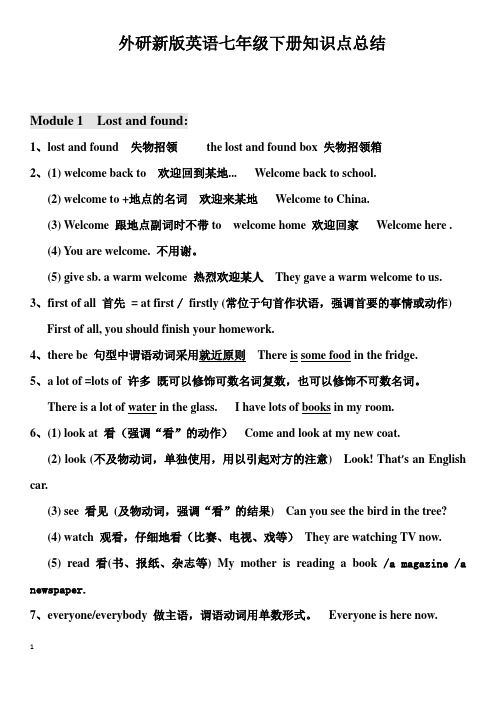
外研新版英语七年级下册知识点总结Module 1 Lost and found:1、lost and found 失物招领the lost and found box 失物招领箱2、(1) welcome back to 欢迎回到某地... Welcome back to school.(2) welcome to +地点的名词欢迎来某地Welcome to China.(3) Welcome 跟地点副词时不带to welcome home 欢迎回家Welcome here .(4) You are welcome. 不用谢。
(5) give sb. a warm welcome 热烈欢迎某人They gave a warm welcome to us.3、first of all 首先= at first / firstly (常位于句首作状语,强调首要的事情或动作)First of all, you should finish your homework.4、there be 句型中谓语动词采用就近原则There is some food in the fridge.5、a lot of =lots of 许多既可以修饰可数名词复数,也可以修饰不可数名词。
There is a lot of water in the glass. I have lots of books in my room.6、(1) look at 看(强调“看”的动作)Come and look at my new coat.(2) look (不及物动词,单独使用,用以引起对方的注意) Look! That’s an English car.(3) see 看见(及物动词,强调“看”的结果) Can you see the bird in the tree?(4) watch 观看,仔细地看(比赛、电视、戏等)They are watching TV now.(5) read 看(书、报纸、杂志等) My mother is reading a book /a magazine /a newspaper.7、everyone/everybody 做主语,谓语动词用单数形式。
新外研版七年级英语下册(全套)模块知识点汇总

新外研版七年级英语下册(全套)模块知识点汇总(共12套38页)新外研版七年级英语下册(全册)模块知识点汇总Module 1 Unit 11.welcome back to + 地点名词欢迎回到……welcome to + 地点名词欢迎来到……2.first of all ⾸先3.lost and found box 失物招领箱lose —lost find — foundlose vi. 丢失;失败, 输掉;lost - lost - lostlose 反义词:find / win短语:get lost 迷路lose one’s way 迷路lose one’s life 失去⽣命lose the match 输掉⽐赛4.look in the lost and found box 往事物招领箱⾥看5.Here is / are …这是……6.be careful with …⼩⼼对待……7.from now on 从今以后from then on 从那时起8.Let me see…让我看看Module 1 Unit 210.at the Lost and Found Office 在失物招领处11.in a hurry 匆忙 = hurriedlyhurry to + 地点匆忙去……hurry to do sth. 匆忙去做……Hurry up! 快点12.leave sth. + 地点状语leave things on planes, on trains, on buses and in taxis 13.That’s why ... 那就是为什么(后加表结果的句⼦)That’s because ... 那时因为……(后加表原因的句⼦)14.at airports / at stations 在机场 / 在车站at the Lost and Found Office15.hundreds of ... 数以百计的thousands of ... 数以千计的millions of ... 数百万的billions of ... 数⼗亿的以上为模糊表达⽅式(注意:s和of 共存亡)a hundred / two hundred / several hundred ⼀百/两百/⼏百16.look for ... 寻找……(找的过程)find ... 找到……(找的结果)17.many other things 许多其他的东西other + n(s) = others 其他的⼈/物(⽆范围)the other + n(s) = the others 剩下所有⼈或物(有范围)18.strange things 奇怪的东西stranger n. 陌⽣⼈19.about adv. ⼤约about pre. 关于20.this week 这周last week 上周next week 下周注意:this, last, next 前不加介词 in , on ...yesterday morningtomorrow afternoon前不加介词21.fifteen kilos of sausages ⼗五公⽄⾹肠Module 1 Unit 31.website ⽹站webpage ⽹页download 下载upload 上传2.search + 地点 + ⽬标在……寻找……3.post 张贴Module 2 Unit 11、ride a bike 骑⾃⾏车2、the new clubs for this term 这个学期的新俱乐部3、on the board 在布告板上4、would like to do sth. 想要做某事would like sth. 想要……would like sb. to do sth. 想要某⼈做某事5、because + 句⼦“因为……”(原因状语从句)6、join + 组织、机构join the army 参军join the Music Club 加⼊⾳乐俱乐部join sb. in sth. / doing sth. 加⼊到某⼈当中⼀起做…… join in + 活动“参……活动”take part in + 活动“参加活动(并起重要作⽤)”7、play the piano 弹钢琴play the voilion 拉⼩提琴play the flute 吹笛⼦play the drum 打⿎注意:以上乐器类前⾯加 the8、play table tennis 打乒乓球play volleyball 打排球play tennis 打⽹球play badminton 打⽻⽑球注意:以上球类运动前⾯不加 the9、 That’s all. 仅此⽽已, 就这么多。
七年级下册英语基础知识归纳(2013外研版)

七年级下册英语基础知识归纳(2013外研版)七年级下册英语基础知识归纳(2013外研版)外语教研版2013新标七年级英语下册知识目标、基础知识汇总一、知识目标【必记单词】Unit 1 ran, eraser, glve, alletath hse, lse, find,ine,urs ,tape purple, hers, areful, nUnit 2 aera phne, leave, plane, taxi,h airprt,hundred,thusand,strange, bat, du, pig, sausage【常考短语】Unit 1 first f all, be areful ith,fr n nUnit 2 bile phne in a hurr, hundreds f, l frUnit 3 help sb (t) d sth,tr t d sth【经典句型】Unit 11 There is/are2 Here is/are3 Please be areful ithUnit 21 A an is taling t2 The are ling frUnit 3The an二、基础知识【短语归纳】1 lst and fund bx失物招领箱2 be arefulith小心一…3 fr n n从现在开始4in a hurr匆匆忙忙hundreds f几百,成百上千6l fr寻找7 first f all首先8tr t d sth_尽力做某事9 hse fr…从……中挑选10 a lt f许多11 at the ent此时此刻12 suh as例如13 have gt有【用法集萃】1 hse+名词+is this?这是谁的……?2 help sb (t) d sth帮助某人做某事3 Please be areful ith…请小心保管……4 ele t+地点欢迎到……all sb at+电话号码拨……给某人打电话【典句必背】1 First f all, e and l in the lst and fund bx!首先,看一下这个失物招领箱!2 Peple ften lse th ings hen the’re travelling r hen the’re ina hurr 人们经常在旅行或匆忙间丢失东西。
(完整)外研版七年级英语英语(下册)知识点归纳,推荐文档

MODULE 1一.短语归纳。
1. l ost and found box 失物招领箱2.be careful with… 小心…3. from now on 从现在开始4.(be) in a hurry 匆忙5. hundreds of 成百上千6.l ook for 寻找(过程)7. first of all 首先8.find 找到(结果)9. try to d o sth 努力做某事(会成功)10.choose from 从…中挑选11.try d oing sth 试图做某事(成功与否未知)12. at the moment 此时此刻13. such as 例如(用于列举)14. for exampl e 例如二.重点句型结构1.Whose + 名词+is this ? 这是谁的…?2.help sb d o sth. 帮助某人做某事3.Please be careful w ith… 请小心保管…4.Welcome to + 地点欢迎来到…5.call sb at + 电话号码拨…给某人打电话三.语法专项。
物主代词:表示所属关系的代词(…属于谁的)MODULE 2一.短语归纳。
1. get on well with sb. 与某人相处融洽2.play the piano 弹钢琴3.play tabl e tennis 打乒乓球4.what about…? =how about…?...怎么样?5.worry about…担心…6.be good at d oing sth. 擅长做某事7.fly a kite 放风筝8.that’s all 仅此而已9.be ready to d o sth. 乐于做某事二.重点句型结构。
1.What / How about d oing sth? 做…怎么样?2.Woul d like to d o sth.. 愿意做某事3.promise to d o sth. 承诺做某事4.play +球类名词玩…球5.play the +乐器演奏…乐器6.d o (some) + 动词ing 形式做…7.be sure of sth …确信…(说话人的信念)We are sure of our success. 我们确信我们会成功。
外研新版英语七年级下册知识点总结(无误+易错词)

外研新版七年级下册知识点总结Module 11、lost and found 失物招领in the lost and found boxat the lost and found office2、welcome back to 欢迎回...welcome to +表示地点的名词欢迎来某地welcome home 欢迎回家You are welcome. 不用谢。
3、first of all 首先at first firstly4、there be 句型中谓语动词采用就近原则5、a lot of =lots of 许多既可以修饰可数名词,也可以修饰不可数名词。
6、look at 看(不一定看见)look 不及物动词,后面不直接加名词see 看见watch 观看,仔细地看(比赛、电视等)read 看(书、报纸、杂志等)7、everyone/everybody 做主语,谓语动词用单数8、be careful with 注意.../小心...9、from now on 从现在开始from then on 从那时开始10、talk to sb 和某人说话(侧重主动说)talk with sb 和某人说话(侧重两人都说)talk about sth 谈论某事say 说,强调说的内容speak 说,后面可以直接接语言speak English/Chinesespeak to sb 和某人说话tell sb sth=tell sth to sb告诉某人某事11、look for 寻找(不一定找到)find (偶然地)找到(强调结果)find out 查明,找到(经过努力)search 搜索,调查look over检查look after =take care of 照顾look forward to 期盼,期待12、get on the bus 上公交车get off the bus 下公交车13、in a hurry 匆忙地hurry up=come on 快点儿hurry to do sth 匆忙做某事14、hundreds of 成百的(大约数加s,加of)two hundred (具体数不加s,不加of)同样用法还有thousand、million、billion 15、every day 每天everyday 每天的(形容词,后面接名词)16、at the moment=at this moment=now 此时此刻,现在看到有at the moment 的句子,谓语动词要用be +动词的-ing形式。
新外研版七年级下册知识点整理(良心出品必属精品)

外研版七年级下册知识点整理MODULE 1 Lost and Found重点短语:1. lost and found box 失物招领箱2. welcome back 欢迎回来3.first of all 首先4. here is/are... 这有...5. from now on 从现在开始6. be careful with 小心保管7. whose bag 谁的包8. talk to sb. 与某人交谈9. mobile phone 移动电话,手机10. get on 上车 ( get off 下车)11. two thousand 两千(thousands of 数以千计的...)12. look for 寻找13. at the moment 现在14. in a hurry 匆忙地15. alot of 许多,大量16. hundreds of 数以百计的17. on the train 在火车上18. every day 每天19. such as 例如20. make a list of 列一张...的清单21. ask/answer questions 问/回答问题重点句子:1.Welcome back to school! 欢迎回到学校。
2.Whose bag is this? 这是谁的书包?3.It’s mine.它是我的。
4.Are these crayons yours? 这些是你的蜡笔吗?5. Whose tapes are these? 这些是谁的磁带?6. Here’s a purple wallet!这儿有个紫色钱包。
7. I think it’s Betty’s. Lingling. 我认为它是玲玲的。
8. Everyone, please be careful with your things from now on. 请大家从今以后仔细对待你们的东西。
9. People often lose things when they’re travelling or when they’re in a hurry.当人们旅行或在匆忙中时,他们经常丢东西。
外研版七年级英语下册M1-6重点总结
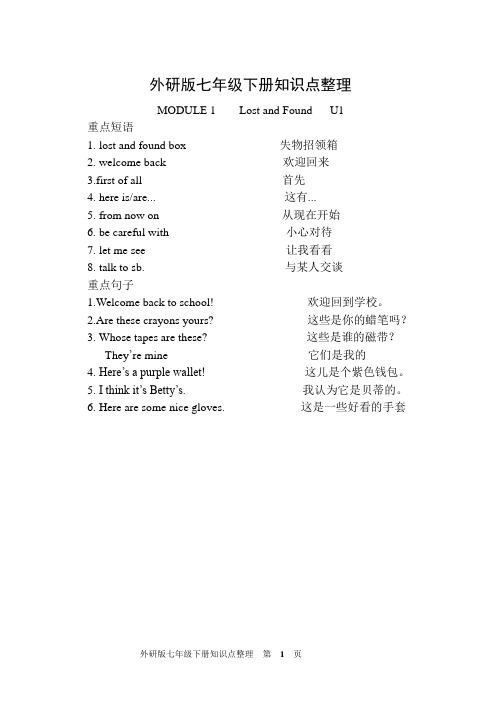
外研版七年级下册知识点整理MODULE 1 Lost and Found U1重点短语1. lost and found box 失物招领箱2. welcome back 欢迎回来3.first of all 首先4. here is/are... 这有...5. from now on 从现在开始6. be careful with 小心对待7. let me see 让我看看8. talk to sb. 与某人交谈重点句子1.Welcome back to school! 欢迎回到学校。
2.Are these crayons yours? 这些是你的蜡笔吗?3. Whose tapes are these? 这些是谁的磁带?They’re mine 它们是我的4. Here’s a purple wallet!这儿是个紫色钱包。
5. I think it’s Betty’s.我认为它是贝蒂的。
6. Here are some nice gloves. 这是一些好看的手套MODULE 1 Lost and Found U2重点短语9. mobile phone 移动电话,手机10. get on the bus 上车11. two thousand 两千12. look for 寻找13. at the moment 现在14. in a hurry 匆忙地15.many other things 许多其他的东西16. hundreds of 数以百计的17. strange things 奇怪的东西18. fifteen kilos of sausages 15公斤的香肠19. such as 例如重点句子7. They leave things on planes, on trains, on buses and in taxis.8. That's why there are lots and found office is at airports and stations9. Hundreds of people come here every day.10.They are looking for their phones cameras, watches, computers and many other things11.There are about a hundred bikes and a large boat12. Are you looking for fifteen kilos of sausages?7.他们把东西落在飞机上,火车上,公交车上或者出租车上。
- 1、下载文档前请自行甄别文档内容的完整性,平台不提供额外的编辑、内容补充、找答案等附加服务。
- 2、"仅部分预览"的文档,不可在线预览部分如存在完整性等问题,可反馈申请退款(可完整预览的文档不适用该条件!)。
- 3、如文档侵犯您的权益,请联系客服反馈,我们会尽快为您处理(人工客服工作时间:9:00-18:30)。
Module71. 序数词前有形容词性物主代词或者名词所有格、形容词时,前面的the省略例如:my first teachers, Tony’s fifth birthday.2. ......的名字是什么?What’s the name of ...? /What was the name of ...?例如:What was the name of your first school?What are the names of your brothers?3. What is/are/was/ were ......like?对品质、性格提问用What does ......look like? 对相貌提问用What does ......like? 对兴趣、爱好提问例如:----What was your first friend like? ----He was friendly and good.----What does your first friend look like? ----He is tall and thin.----What does your first friend like? ----He likes swimming.4. 出生于be born用语过去时(born为bear的过去分词,过去式为bore)例如:They were born in 1999, but I was born on December 19th, 2000.My father was born in a small village, and my uncle was born in a city.5. be strict with sb. 对某人严格、严厉in sth. 对某事严格、严谨例如: My mother is strict with me but she isn’t strict in her work.6. be friendly to sb. 对某人有好, 类似的结构还有be kind to sb.例如:She is friendly to us everyone.friendly 反义词unfriendly以ly结尾的形容词还有,lovely,lonely,ugly,silly,weekly,monthly,等等7. (a) very adj./adv.(原形) + n.太....,非常....,很..... quite( a/ an)+ adj./adv.(原形) + n.so+ adj./adv.(原形) +that +从句译为:如此…以至于too adj. to do sth. 译为:太……而不能例如: a very big watermelonquite a big watermelonThe watermelon is so big that I can’t eat it all.The watermelon is too big to be eaten.8. past 与pass的区别past 为介词,副词,形容词,如:(1). go past the hospital and turn left. (2). They are talking about past life. (3). It’s ten past four.而pass为动词,如: Please pass me the pen.The police car passed slowly.9. “在某地有……要做”用句型there is/are/was/were +sth.+to do…例如:There were a lot of things to do in Quincy.There are lots of interesting places to visit in Tianjin.表示“某人有某事要做”用have/has sth. to do例如:They had many things to do, and I have lots of books to read.10. one of + 名词复数表示“……中之一” One of my dear friends is a po lice.two of /some of/ many of/ most of……one of + the+最高级+名词复数例如:The Yangtze River is one of the longest rivers in China.Most of the people in this room are over forty.11. ……there was a big garden with lots of trees and there was a small la ke with many fish in it.with 的用法总结with用法归纳(1)“用……”表示使用工具,手段等。
例如:①We can walk with our legs and feet.②He writes with a pencil.(2)“和……在一起”,表示伴随。
例如:①Can you go to a movie with me?②He often goes to the library with Jenny.(3)“与……”。
例如:I’d like to hav e a talk with you.(4)“关于,对于”,表示一种关系或适应范围。
例如:What’s wrong with your watch?(5)“带有,具有”。
例如:①He’s a tall kid with short hair.②They have no money with them.③There is a big house with a swimming pool.(6)“在……方面”。
例如:Kate helps me with my English.(7)“随着,与……同时”。
例如:With these words, he left the room. 说完这些话,他离开了房间。
12. fish 作名词时可以翻译为:鱼(可数,单复数同形)如; many fish作“鱼肉”讲时,为不可数名词。
作“鱼的种类”讲时,为可数名词,可以变复数。
如: We have five fishes in this river. 这条河里有5种鱼。
13. I was there for the last time in 2010.last 为形容词,译为“最后的,最近的”如:December is the last month of a year.I was the last to come to school.1作动词讲时,译为“持续”The meeting lasted for three hours. Module8 知识点总结1. once upon a time 从前2. decide to do sth. 决定做某事decide not to do sth.3. go for a ride / walk 去兜风/散步4. in the forest 在森林里5. pick flowers 摘花pick up sth. 捡起/拿起某物pick it/ them up6. be lost/ lose one’s way 迷路She is always lost in Beijing.7. look around+sb.(宾)看某人的四周look around her/me /him…8. notice sth. 注意到某物9. hurry to + sw. = go to sw. in a hurry 急忙去某地He hurried to school without having breakfast.10. knock on / at the door 敲门11. open 开着的adj. closed 关着的adj.The door is closed, but the window is open.open 打开;经营He opened the door and it’s open now.12. enter + sth 进入…… They entered/went into the building.13. finish sth. She finished the food soon.finish doing sth. She has to finish doing her homework now.16. try (tried) to do sth. 尽力做某事不要与tired (累)混淆try sth 试某物try it/ them on17. be in pieces 坏了18. walk into the bedroom 走进卧室19. very soon 不久;很快20. be/fall asleep(形容词)= be sleeping(动词)21. in pieces 成了碎片22. at first 起初at the beginning of / first of all23. point at 指着……24. There’s the naughty girl. 倒装句,原句为:The naughty girl is there. 有一个淘气的女孩。
There is a naughty girl.25. open one’s eyes 睁开眼睛26. be around sb. 在某人周围The students are around the teacher.27. jump out of bed and hurry out of the house 跳下床匆忙冲出房子28. without sth. 没有某物He went to school without his bag.without doing sth. 没有做某事She left without saying a word.without anything= with noting29. return to sw. = come back to sw. 返回某地return= give backThey returned to China yesterday. 他们昨天返回中国。
30. 讲故事的顺序:First… Next… Then… Finally…31. and 前后的时态要一致He entered the house and sat down.32. the food in the big bowl 大碗里的事物(介词短语作定语)the man under the tree 树下的那个男人一般用which提问33. live in the forest 住在森林里34. answer the door 开门I knocked on the door but nobody answered the door.35. all around/over the world 全世界36. tell sth to sb 或tell sb. sth 告诉某人某事tell a story tell stories 讲故事tell children fairy tales 给孩子们讲童话故事37. again and again 一遍又一遍38. begin with “ Once upon a time…”以“从前……”开头39. change into 变成Module9 知识点总结1. listen to the radio 听收音机2. Teachers’ Day Women’s Day Christmas Labour DayChildren’s Day New Year’s Day National Day3. 十二个月份January February March April May JuneJuly August September October November December October is the tenth month of a year.在几月用介词in,如; in January.月份可以缩写为前三个字母加“.”,如:Jan./Feb./Mar.4. start school 开始上学start/begin to do sth. start doing sth 开始做某事5. ride a bike to sw. 骑自行车去某地go to+地点by bikewalk to sw. 走着去某地go to +地点on foot类似的结构还有take a bus/train… to+地点=go to +地点by bus/train…6. be famous for+原因以……而成名be famous as+职业作为……而闻名7. a successful actor 一名成功的演员success(名词) ,successful(形容词), successfully(副词), succeed(动词)succeed, success, successful21)succeed “成功”,是不及物动词;succeed in doing sthHis plan succeeded.At last he succeeded in finishing the work.He succeeded in getting the job.2)success n. 表示抽象意义的“成功”,是不可数的;表示具体意义的“成功的人或事”, 则是可数的。
